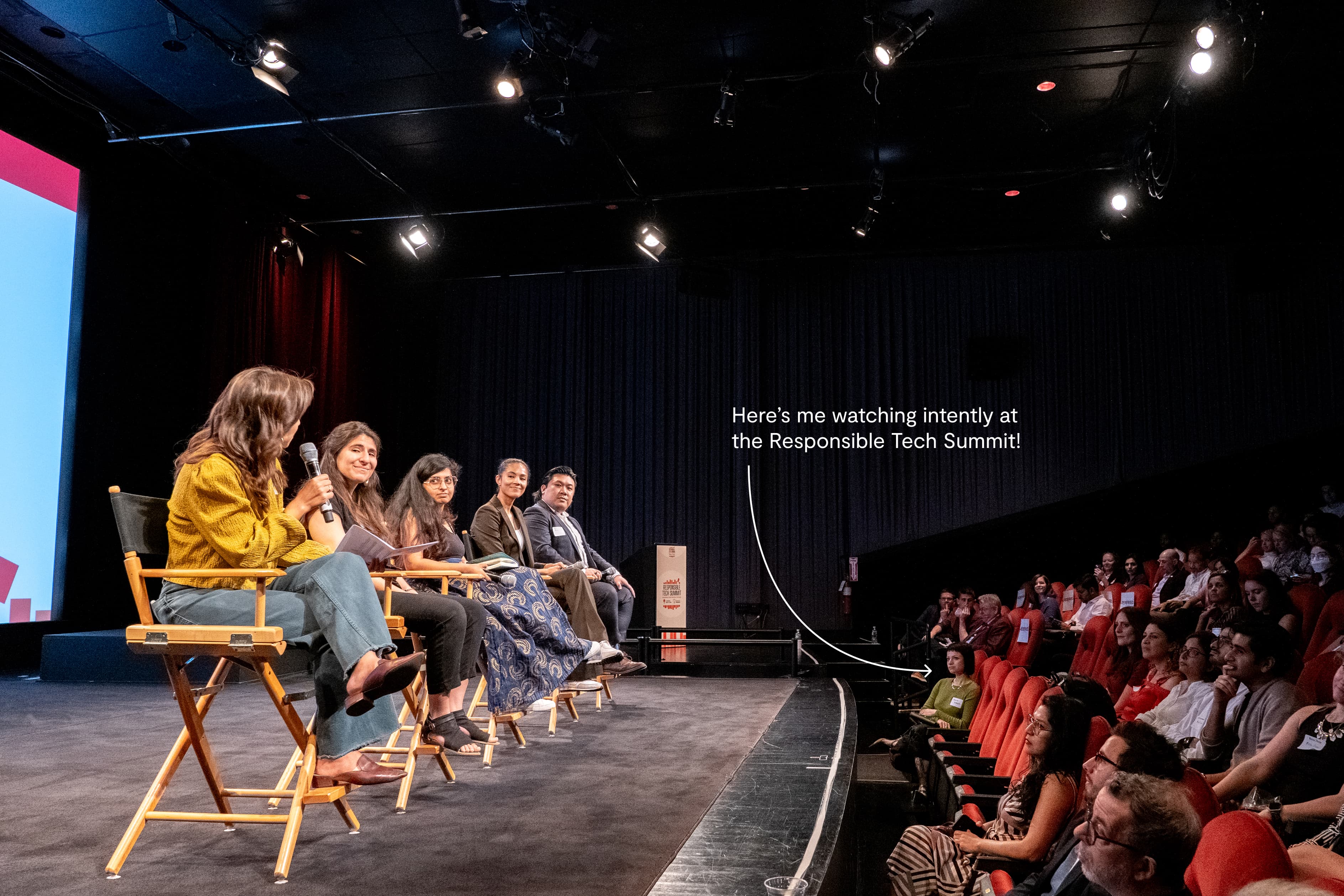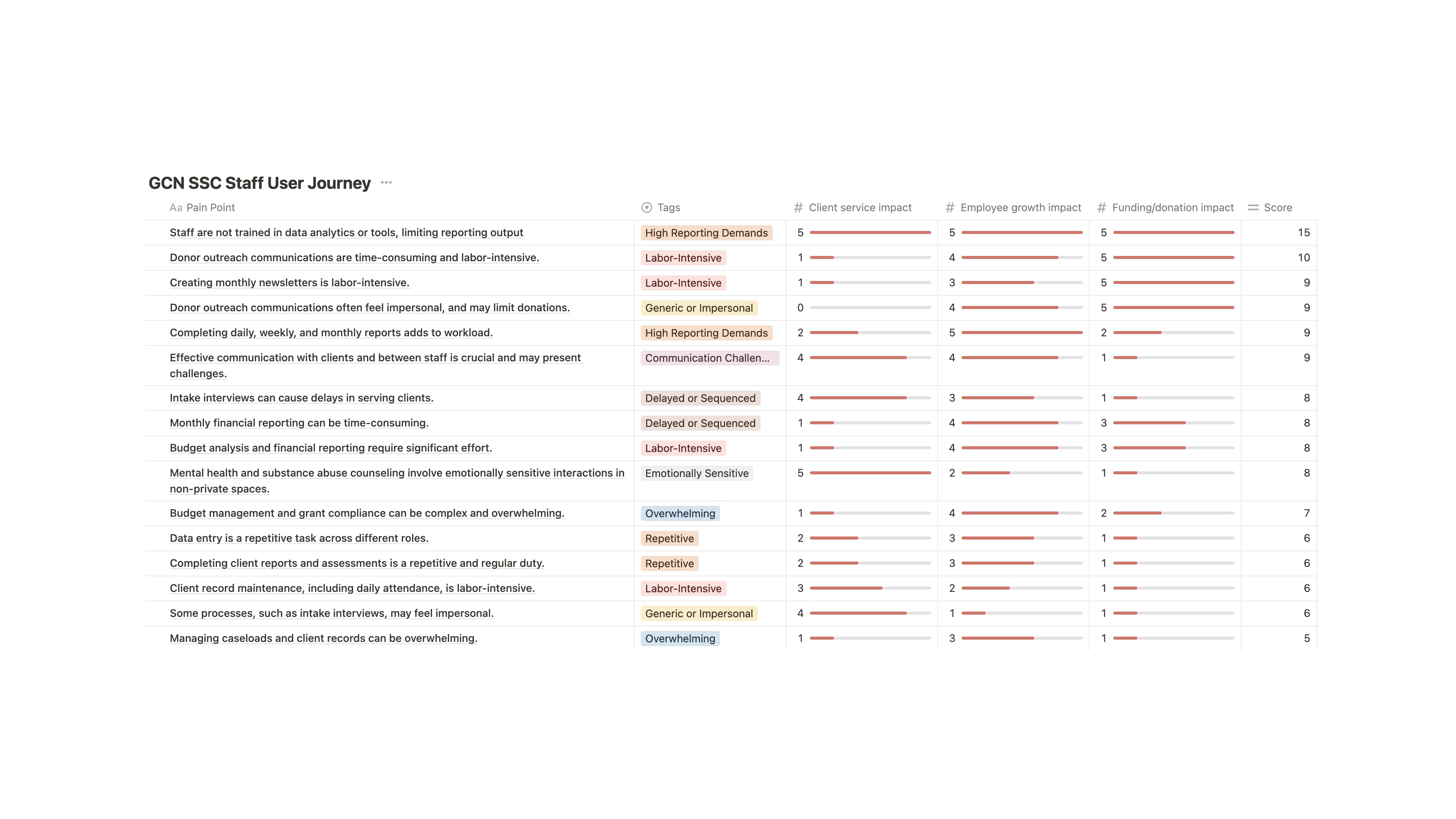AI for Everyone, Deeplearning.ai
The Age of AI by Henry Kissinger, Eric Schmidt, and Daniel Huttenlocher
A People’s Guide to AI, Mimi Onuoha and Mother Cyborg
Machine Learning Yearning, Andrew Ng
“Computing Machinery and Intelligence” Alan Turing
“How to Succeed with AI Augmentation”, MIT Sloan
The Challenge
With tech evolving so quickly, how do I stay ahead of the game and keep leveling up my skills? And how can I use what I know to make a real difference in my community at the same time?
The Solution
I devised a comprehensive research strategy focused on the nuances of Artificial Intelligence (AI), exploring foundational principles, ethical considerations, and practical applications. To supplement my learning, I participated in AI-focused panels, symposiums, and conferences spanning multiple continents. In parallel, I harnessed my growing expertise to spearhead tech-driven transformations across three NYC housing shelters, enhancing their capabilities to more effectively serve our community.
The Impact
My ongoing collaboration with my initial shelter partner resulted in a dramatic 80% decrease in physical storage, 60% faster document retrieval, and a 30% cut in client intake time. Through the introduction of targeted data strategies, we saw a 20% QOQ surge in donor funding. I also led workshops on responsible LLM usage across three shelters, equipping staff with the tools and confidence to engage donors strategically and effectively.
Introduction
I’ve always prioritized giving back, whether volunteering at local soup kitchens, supporting animal rescues like Galgos del Sol, or working with sustainability-focused organizations like FABSCRAP. But during the early days of the COVID-19 pandemic—a time of reflection for so many—I experienced a deeper realization. I wanted to do more for my community and began exploring how my skills could align with its needs.
This shift in perspective gained momentum as I connected my drive to make an impact with my growing interest in artificial intelligence. My curiosity about AI started in mid-2018 after reading a Harvard Business Review article on collaborative intelligence. Then, in July 2020, OpenAI’s release of GPT-3 became a turning point. I could no longer ignore the creative and transformative potential of AI across industries.
Seeing AI through this lens, I realized the value of stepping back from my usual commitments to focus on deepening my knowledge, expanding my skills, and building connections in the field. This intentional shift also created the opportunity to channel my expertise into meaningful, community-centered impact.
Structured Learning in the AI Era
Research and Foundations
With a prior foundation in developing AI and ML-powered products, I approached my learning with a structured and intentional focus. I built a research syllabus around six core themes, balancing theoretical insights, ethical considerations, and real-world applications.I started with Deeplearning.ai’s AI for Everyone course, which provided an accessible entry point into the technical essentials of AI. From there, I explored foundational works like Alan Turing’s Computing Machinery and Intelligence, grounding myself in the key concepts and history of the field.
Next, I turned my attention to the complex dynamics of human-technology interactions. Sherry Turkle’s research was a major influence during this phase, particularly her work on how people form emotional connections with machines. Her insights offered a nuanced view of the evolving relationship between humans and AI.
I then dove into critical perspectives on AI, engaging with thought leaders like Meredith Broussard and Kate Crawford. Their work sharpened my understanding of the social and systemic challenges AI presents. To deepen this lens, I completed Ethics and Bias courses from UC Santa Cruz and Lund University, which expanded my understanding of responsible AI development.
Finally, joining the All Tech Is Human community gave me access to a wealth of resources and like-minded thinkers committed to ethical technology. This collective effort shaped my approach to AI, reinforcing the importance of balancing innovation with responsibility and empathy.
Areas of Research
The Second Self Sherry Turkle
AI Superpowers, Kai-Fu Lee
“Authenticity in the age of digital companions” by Sherry Turkle
“Artificial Intelligence and Psychoanalysis: A New Alliance” by Sherry Turkle
"Emotions in Human and Artificial Intelligence" by Martınez-Miranda and Aldea
"In Machines We Trust" MIT Technology Review
AI, Empathy & Ethics, UC Santa Cruz
Artificial Intelligence: Ethics & Societal Challenges, Lund University
The Atlas of AI by Kate Crawford
“Fairness and Abstraction in Sociotechnical Systems” by Andrew D. Selbst, danah boyd, Sorelle A. Friedler, Suresh Venkatasubramanian, and Janet Vertesi
“Recommendation on the Ethics of Artificial Intelligence”, UNESCO
“The Responsible Tech Guide”, All Tech is Human
Human Factors in AI, Duke University
Managing Machine Learning Projects, Duke University
AI for People and Business by Alex Castrounis
Prediction Machines by Ajay Agrawal, Joshua Gans, and Avi Goldfarb
“A critical field guide for working with machine learning datasets”, Sarah Ciston
“Human-AI Collaboration in Healthcare: A Review and Research Agenda”
Artificial Unintelligence by Meredith Broussard
The Cultural Life of Machine Learning by Jonathan Roberge
New Dark Age: Technology and the End of the Future by James Bridle
You Look Like a Thing and I Love You by Janelle Shane
“Mean Images”, Hito Steyerl
Superintelligence by Nick Bostrom
AI 2041 by Kai-Fu Lee
The Age of Em by Robin Hanson
Architects of Intelligence by Martin Ford
“Artificial Intelligence and the Future of Humans”, Pew Research Center

Bridging Theory and Practice
The drive to move beyond theory and engage with the fast-evolving world of AI kept me energized throughout this period of focused exploration. I took every opportunity to attend events like The AI Summit London, The Dubai Future Forum, and the Responsible Tech Summit. Engaging with industry experts, thought leaders, and policymakers gave me invaluable perspectives on AI’s transformative potential across industries.
Real-world Impact Through Collaboration
From the start of this focused period, I partnered with GCN SSC, a local emergency housing shelter where I had previously volunteered. I conducted in-depth interviews with staff, analyzed their workflows, and studied industry benchmarks and best practices. One key observation stood out: the shelter’s heavy reliance on physical documentation, which impacted nearly all aspects of their operations. Our first project tackled this head-on, transitioning their paper-based processes to a cloud-based document management system. This shift not only streamlined their workflows but also significantly reduced their environmental footprint.

Building on this momentum, I explored ways for the staff to leverage Large Language Models (LLMs) to address existing workflow challenges in ethical and responsible ways. I led workshops to guide the team on safe usage and privacy considerations, equipping them with the skills to use LLMs for tasks like drafting newsletters, engaging donors, and creating social media content. Framing LLMs as collaborators rather than replacements for human creativity allowed us to balance efficiency with a personal touch.
The impact of these workshops extended beyond GCN SSC, leading to collaborations with two additional NYC shelters in their network. These partnerships underscored the potential of integrating AI to create meaningful, transformative change in nonprofit operations.
Result
The transformation at GCN SSC was profound. We achieved a 30% reduction in client intake times, an 80% decrease in physical storage needs, and a 60% improvement in document retrieval times. These operational enhancements led to a 20% quarter-over-quarter increase in donor funding, amounting to nearly half a million dollars in additional resources to support the community.The success of our initiatives at GCN SSC inspired further collaborations with two more NYC shelters, spreading the benefits of AI integration and responsible technology use across the community.